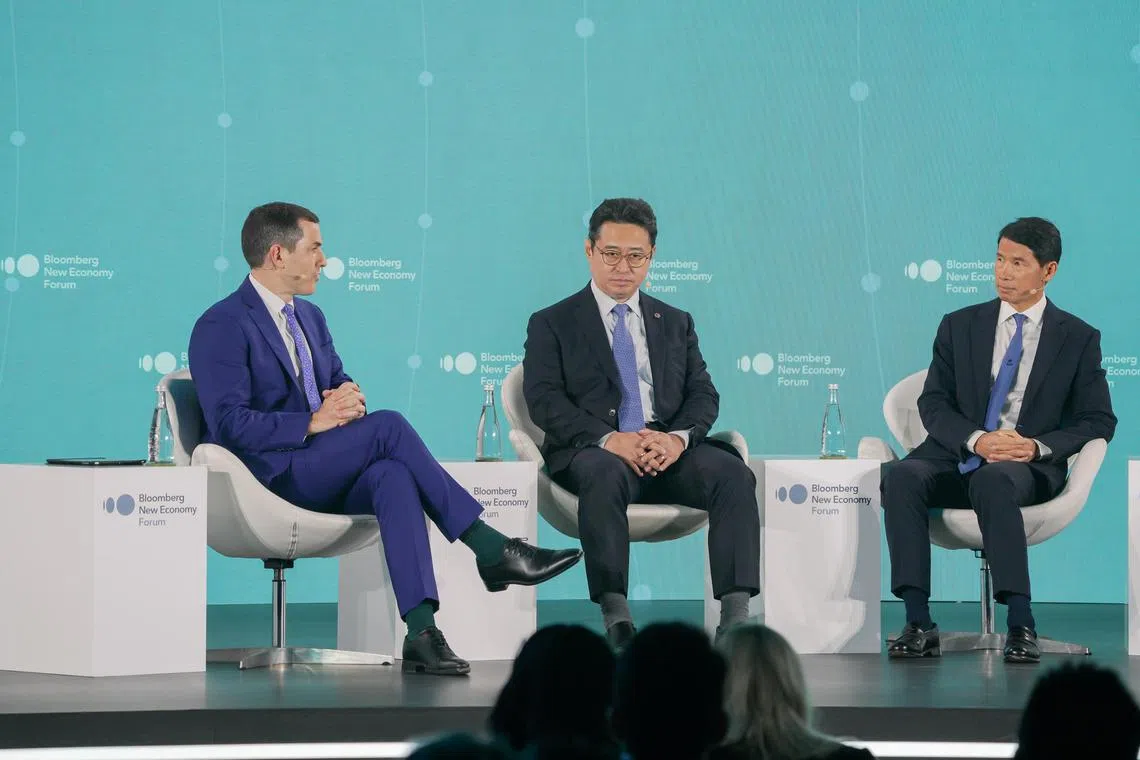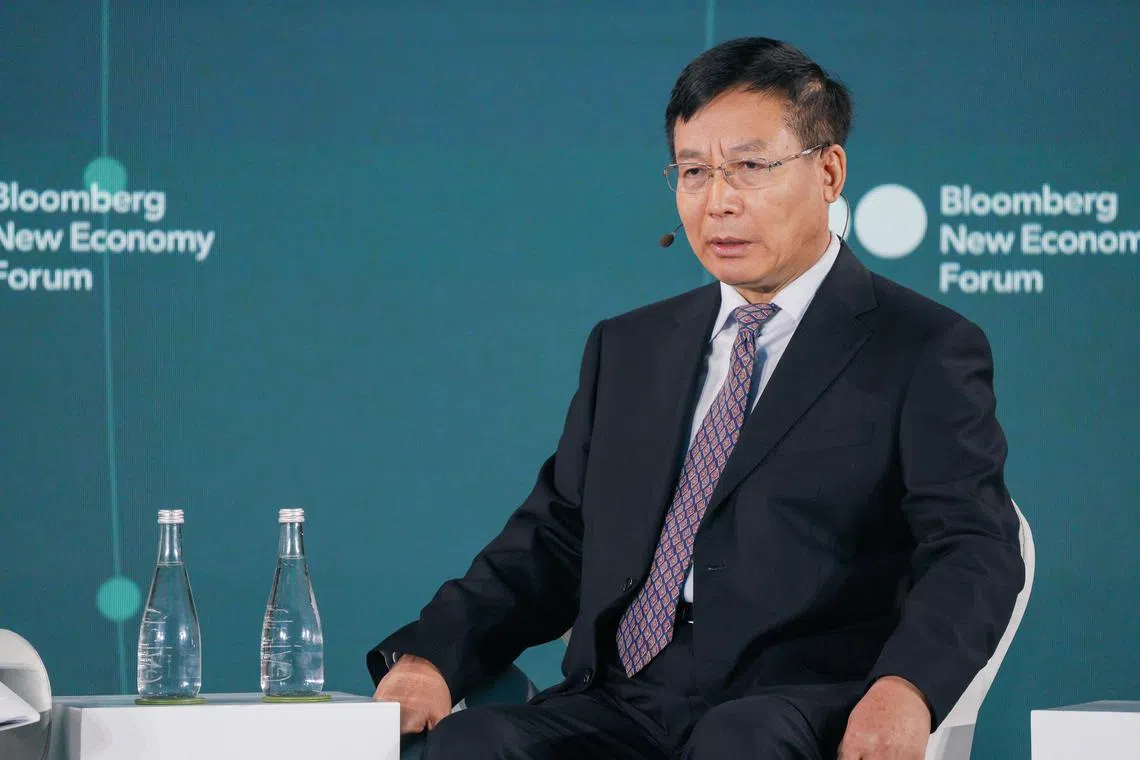Chinese economy different from Japan in its ‘lost decade’, say leaders of Chinese financial firms
Sign up now: Get ST's newsletters delivered to your inbox

(From right) Mr Fred Hu, founder and chief executive officer of Primavera Capital, Mr Benjamin Deng, chief investment officer of Ping An Group, and moderator Tom Orlik at the Bloomberg New Economy Forum on Nov 8.
PHOTO: BLOOMBERG NEW ECONOMY FORUM
Follow topic:
SINGAPORE – China’s current economy faces some challenges that bear similarities to the economic malaise that afflicted Japan during its “lost decade” of the 1990s, but leaders of Chinese financial firms on Wednesday said that there were key differences as they made a pitch for foreign investment.
Economic analysts have pointed out parallels between the two nations, such as deflationary pressures, rapidly ageing populations, rising debt levels and the collapse of real estate bubbles. These have stoked fears that China is headed towards “Japanification”, defined as a protracted period of economic sluggishness, with low growth, low inflation and low interest rates.
Speaking at the Bloomberg New Economy Forum held in Singapore, Mr Benjamin Deng, chief investment officer of insurance and financial services firm Ping An Group, pointed out that China has a bigger and more diverse economy than Japan did then.
It is also a more innovative economy than Japan was, said Mr Gary Rieschel, founding managing partner of venture capital firm Qiming Venture Partners.
Private entrepreneurs, who have driven China’s economy for over 20 years now, are active in multiple sectors of interest to investors, he added. These include artificial intelligence, semiconductors, advanced manufacturing and biotechnology.
Along with Chinese officials speaking at the forum, they made a pitch for more foreign investments in China.
Former party secretary of China’s State Administration for Market Regulation, Mr Bi Jingquan, said that investors who left China during the Covid-19 pandemic should come back and have a look at the country now.
Despite some problems in the real estate sector and with local government debt, the Chinese economy is recovering well and has huge potential for growth, he said.
China’s gross domestic product grew 5.2 per cent year on year in the first three quarters of 2023, and is expected to reach 5 per cent for the year, said Mr Bi, who is now executive vice-chairman of the China Centre for International Economic Exchanges, a Beijing-based think-tank.
This means the world’s second-largest economy will meet its economic growth target for the year, after missing it last year.
China has not lost its advantage as an international manufacturing centre, and as a big market, it is very attractive, added Mr Bi.
Chinese Vice-President Han Zheng, who gave an opening address at the forum, said that China would “provide more market and investment opportunities for companies from all over the world”.
The country is nurturing new growth drivers at a faster pace, with high-tech manufacturing and services enjoying a growth rate that was much higher than the average of the manufacturing sector, he added.

Mr Bi Jingquan said China has not lost its advantage as an international manufacturing centre, and as a big market.
PHOTO: BLOOMBERG NEW ECONOMY FORUM
The financial leaders said that although the economy faced short-term uncertainties, pessimism about the economic outlook was overblown.
Mr Fred Hu, founder and chief executive officer of investment firm Primavera Capital, said that China’s property crisis, like Japan’s in the 1990s, is still unfolding in “slow motion”. This is a problem that China will have to deal with for at least a few more years.
But while traditional residential housing might take more time to recover, other types of property – including rental units and industrial parks – are generating interest among investors, said Ping An’s Mr Deng.
Both he and Mr Hu agreed that the Chinese government retains many levers to support the economy.
“China still has more monetary and fiscal tools in its box,” said Mr Deng.
One such tool is the central bank’s interest rates, which he said were “not low enough”. Decreasing interest rates induces spending.
Unlike municipal governments, which are struggling with debt, the national government has a very strong fiscal position, with which more can be done, Mr Hu said.
Right now, Chinese entrepreneurs are “lying low or lying flat”, with a sense of insecurity not seen since the start of reform and opening up in 1978, said Mr Hu.
If China commits to the rule of law and market reforms, confidence among entrepreneurs and in the economy will slowly but surely come back, he added.
The Chinese government’s support of entrepreneurs and commitment to market reforms will be key to restoring confidence in the economy, the panellists said.
Meanwhile, asked to comment on US-China relations during a separate session at the forum, Singapore Foreign Minister Vivian Balakrishnan said that with a meeting between US President Joe Biden and Chinese President Xi Jinping on the horizon, “the weather has improved” and “is a bit sunnier”.
However, “the climate has not, and that’s what we all have to be concerned about”, he added.
Ahead of the expected meeting in San Francisco next week, Vice-President Han spoke of positive signals in China-US interactions – the most recent being Chinese Vice-Premier He Lifeng’s visit to the US this week.
The international community’s expectations of an improvement in China-US relations has been raised following a series of high-level exchanges between China and the US over the past months, he noted.
Beijing is ready to strengthen communication and dialogue with the US at all levels, Mr Han said.

